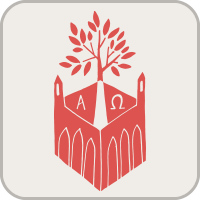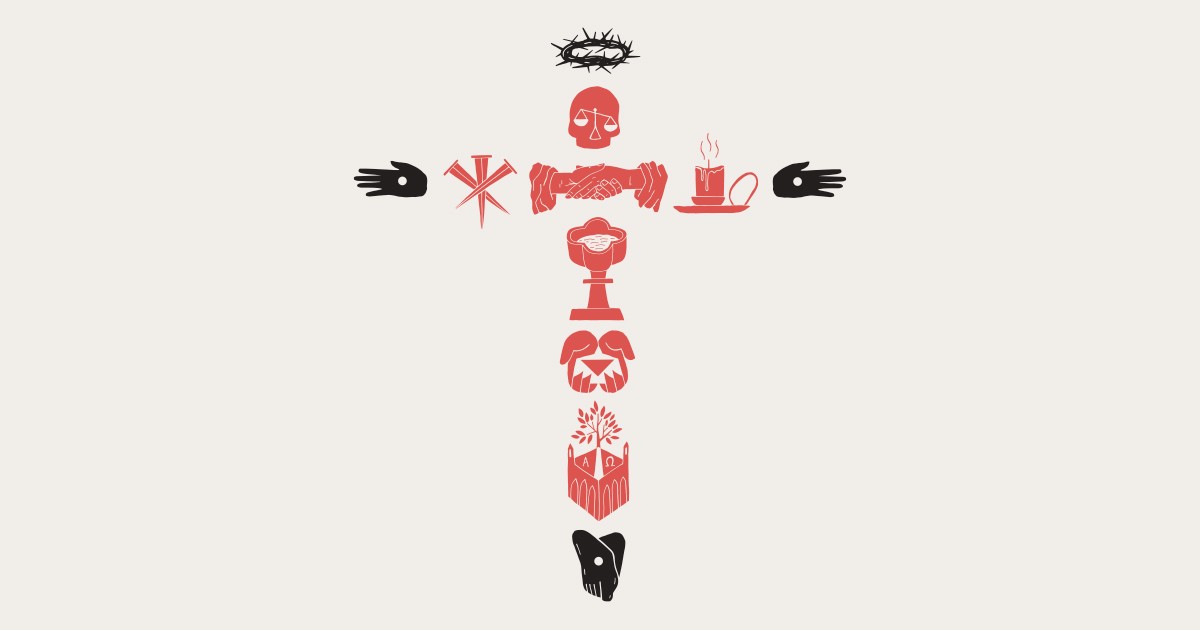On Good Friday, as Jesus hung on the cross, he spoke his final words. These seven sayings, gathered from the four Gospels, have often been used for prayer and reflection during Holy Week. Traditionally, they are known as “words”—of salvation, forgiveness, relationship, abandonment, distress, triumph and reunion. What do these words mean for those who are vulnerable and suffering today? Seven officers and employees who work in Salvation Army social services ministries contemplate these sayings.
 SALVATION
SALVATION
“Truly I tell you, today you will be with me in paradise.”—Luke 23:43
As I sit at my desk, I close my eyes and picture the folks I encounter here at the London Centre of Hope, Ont., who struggle with addiction, mental health and homelessness. All too often, the people we serve believe they are being punished by God for their present situation. Their suffering is a daily burden, a cross to carry.
I weep for those struggling, not just for their suffering, but for their souls. How do we offer hope to those who are vulnerable and marginalized? How do we offer a change of heart?
On the cross, in his last dying moments, the thief looks at Jesus and recognizes him for who he is, realizing that his future is in this person next to him. There was no Bible study group, no church service, no evangelistic event, just the person himself.
I wonder, what did the thief see? Did he see Jesus’ suffering and was that something to which he could relate? Did he recognize Jesus’ innocence and feel the injustice of his death? Or did he just simply sense God and that was enough to believe?
Earlier in Luke’s Gospel, Jesus said, “Let the little children come to me” (Luke 18:16). We are all God’s children. Jesus wants nothing more than for his children to come to him.
But is salvation for the world to come the only good news the people we encounter need? I cannot help but wonder if there is more to salvation than this. It starts with a personal transformation, but it doesn’t end there.
The folks we encounter every day need to know that the “cross” they carry can only be carried by the grace of God who asks to be their cross bearer. As the hands and feet of Jesus, we need to reach out in practical ways to meet each one at their point of need and show them the hope that Jesus offers.
—Jon DeActis is the executive director of the London Centre of Hope, Ont.
 FORGIVENESS
FORGIVENESS
“Father, forgive them, for they do not know what they are doing.” —Luke 23:34
These words by Christ have a profound implication for social services as they relate to people with differing abilities—individuals with developmental disabilities, seniors, people with mental-health challenges—and in how we embrace and learn from the past, how we provide services now and how we deliver services in the future.
Unfortunately, the history of social services is fraught with examples of accepted community practice that treated people who were different unjustly, and they are points of shame in our collective psyche.
In stark contrast to these occurrences, Christ’s words on the cross portray the ultimate in compassion and grace—words that challenge all of us to act with understanding and forgiveness in all we do. It is a call to not focus on the evil, but on the ignorance, and how we, as part of broader society, can work to counteract this ignorance.
For social services professionals, it means not to vilify, but to forgive and educate; not to punish, but to teach, mentor and embrace; and not to forget an offence, but rather to use these situations as opportunities to demonstrate God’s love and to support essential activities, such as learning, healing, development and growth. And for the people we support who may behave in ways that breach societal norms, the message is to look past the behaviour to the human within, and exercise the same paradigm: forgive, learn, educate and embrace.
For us as individuals, Christ’s words should help us recognize that we will inevitably make mistakes and, in doing so, we need to be able to forgive ourselves when they occur, learn from them and go on to make the lives of those around us better.
Embracing Christ’s words, to forgive, and then addressing the knowledge gap, can only make our responses more human, our supports more beneficial to individuals and society, and our work going forward more illustrative of the example Christ sets for us all.
—Arthur Mathews is the executive director of London Village, Ont., and Broadview Village in Toronto.
 RELATIONSHIP
RELATIONSHIP
“Woman, here is your son … Here is your mother.” —John 19:26-27
A starker contrast is hard to imagine. Four soldiers, girded in violence as armour; across from them, three women and John, garbed in grief and fear. Between them hangs Jesus, wearing bruises and blood as a garment. His words rasp from his throat, yet they reform reality: “Woman, here is your son,” and to John, “Here is your mother.”
No mere act of compassion, his words embody the completion of his mission. Mary, a one-time refugee with a questionable past, now a widow with an uncertain future. John, the son of an established family with every option before him. Different people, with different backgrounds and different stories. They had nothing in common, except disappointment, pain, grief—and Jesus.
“You. Are. Family.” And it was so. Because of Jesus, lasting hope was given practical form.
It still happens today, when people gather who have nothing in common—except Jesus.
At the Winnipeg Centre of Hope, one of our chaplains had a vision for a music ministry. He invited anyone who would like to be part of it to respond. And so Hope Choir was born. Residents, staff and volunteers gather, representing vastly different backgrounds, stories and circumstances. Yet all sing the same song—because of, and for the glory of, God. These everyday, ordinary people are not defined by their individual histories, but by their shared hope in Christ.
Whatever the name over the door, this is ultimately what it means to be a centre of hope. It encompasses our social mission—indeed, our whole mission: ministering to others in such a way that lasting hope is given practical form. By God’s grace, and for his glory, let’s all be about it.
—Major Bruce Mac Kenzie is the assistant executive director of the Winnipeg Centre of Hope.
 ABANDONMENT
ABANDONMENT
“My God, my God, why have you forsaken me?” —Matthew 27:46; Mark 15:34
When we think about the Crucifixion, we tend to focus on the physical suffering Jesus endured. In this statement uttered by Jesus, a quote from Psalm 22, Jesus is saying that God has turned his back on him, and, in that moment, he feels abandoned.
This statement reveals deep emotional pain, one that is shared by many who come through our Army doors: the feeling of being alone, forsaken, forgotten and abandoned, with nowhere to turn.
Let’s look for a moment at Christ’s inner circle, his chosen 12, with whom he spent the bulk of his time. Those he supported, encouraged and helped when things got tough. After his arrest, they took off. Amid his anguish, Jesus’ trusted friends turned their backs on him.
And on the cross, as he became sin for us, he experienced the ultimate rejection and feeling of abandonment as God turned his face away from his Son.
Many people who are struggling through pain and despair feel forsaken, that the people they depended on have disappeared.
Questions arise. Where is God when everything in our world is falling apart? When our finances are crumbling, our health is deteriorating and our families have turned their backs? When we cannot find our way, when our path is not clear, when our minds are filled with fear and anxiety—where are you, Lord?
As believers, we know there is hope because of the Resurrection, because Christ was victorious over sin and death. It is true that people will let you down, will turn their backs on you and cause you pain. Jesus was forsaken, betrayed and crucified but he conquered all of that. People are imperfect, but Christ is risen and victorious. He overcame and we can, too, in his strength and in his power. When we put our trust in God, we are not forsaken. This is the message that we deliver to the world: there is hope. Life is worth living, just because he lives.
—Major Elaine Bridger is the executive director of the Edmonton Centre of Hope.
 DISTRESS
DISTRESS
“I am thirsty.”—John 19:28
L’Abri d’espoir is a place of welcome and safety for women in vulnerable situations. In this context, Jesus’ declaration, “I am thirsty,” offers a profound message of comfort and hope to women facing violence, deprivation, fear or isolation. In his physical and emotional suffering, Jesus becomes a figure who understands the pain of the oppressed and invites them to feel seen and loved.
In response to his request for water, Jesus is given sour wine. Similarly, the women sheltered at L’Abri d’espoir have often received abuse and harm from society rather than care and protection. For some of them, oppression and violence have been their reality for some time or all their lives. “I am thirsty” evokes not only a physical need to drink, but also a thirst for justice and dignity. In his obedience to the Father, Jesus demonstrates confidence that there will be an end to his agony and sorrow, giving us all hope for a better future.
L’Abri d’espoir helps and responds to the thirst of women in need. It is a safe place where they can gradually regain their dignity, rebuild their identity and begin to heal their inner wounds. Jesus shows that there is always a path to restoration, even in the darkest moments.
When Jesus says, “I am thirsty,” the words take on powerful meaning. They become a call to all humanity for solidarity with those experiencing distress and suffering.
—Maricarmen Raudales is the executive director of L’Abri d’espoir in Montreal.
 TRIUMPH
TRIUMPH
“It is finished.”—John 19:30
When Jesus cries out, “It is finished,” it is a declaration of total triumph over sin and death—our debt paid in full. When we reach out with love that embodies empathy and creates community, it amplifies Jesus’ cry of victory by demonstrating there is nothing separating us from the love of God. It is this love in action that reaches into the darkest places to announce we never have to be alone again, because the work completed on the cross was the ultimate reconciliation.
It has been said that the most profound sense of loneliness comes when we are surrounded by people, when the absence of connection or sense of belonging leaves us feeling truly alone. Most of us can recall a time when we felt the weight of invisible solitude, but in my work as a counsellor with marginalized individuals, I see how it can permeate a person’s existence.
Particularly when someone is unhoused, being alone can be both a luxury and a burden. To eat you may have to line up at the local community meal and sit in a busy dining room. Your bed might be a cot in a room full of others, your neighbour sleeping just a few feet away. Yet in the constant presence of others, many people I work with talk about feeling utterly alone. Through them I have learned that the darkest times we experience are not necessarily the tragedies we endure, but the despair that comes when we feel there is no one who can share our burden.
When served with a truly loving heart, a hot meal or kind word can become a connection to the eternal hope won for us on Calvary, not just for those we serve but for us as well.
—Melissa Noble is a mental-health counselling specialist at St. John’s Housing and Community Services (Ches Penney Centre of Hope) in St. John’s, N.L.
 REUNION
REUNION
“Father, into your hands I commit my spirit.”—Luke 23:46
After experiencing unimaginable suffering—insult, injury, torture and betrayal— the Lord’s last act before his death is a public affirmation of his trust in God. Christians understand, as a tenet of the faith, that our hope and salvation come through Jesus’ willing sacrifice and enduring faith. It is through this act we are restored.
Those we serve at the Victoria Addictions and Rehabilitation Centre are no strangers to suffering. Their lives tell stories marked by trauma, abuse, violence, hunger and neglect. It is something that binds them as a community, and it is something they share with God’s Son. At an evening Bible study in our chapel on a Thursday night, the participants nod in agreement as they discuss Christ’s vulnerability. Jesus’ pain is honest, relatable; his commitment unwavering. The discussion leads to a shared reflection on not only the agony that leads to the false promise of addiction, but the hardship involved in recovery.
There is a striking parallel between an individual’s recovery journey and the words of Christ uttered in Luke. Recovery is a holistic process driven by hope and the agency of a person committed to change. Since addiction touches on our physical, spiritual, social and psychological being, the transformation necessary to be free from addiction demands remaking one’s entire life and identity. Friends and family members are lost along the way; a new community embraced; skills acquired; trust restored; the gauntlet of grief and shame confronted.
As the participants reflect on what they have given up, they consider a Saviour who understands the cost of sin and the faith required to obtain hope for a new tomorrow. On a recovery journey that tests them in every way possible, members of the ARC community identify with Jesus because he is a man acquainted with grief, whose faith does not falter. They acknowledge the truth of Christ’s words on the cross, and those echoed by Saint Augustine some 400 or so years later: “Our hearts are restless until they rest in you.”
—Jonathan Hopkins is the executive director of the Victoria Addictions and Rehabilitation Centre.
Illustration: Scott Erickson
This story is from:










Leave a Comment